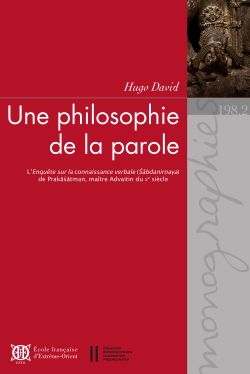
Cet ouvrage de Hugo David cherche à circonscrire l’apparition, au Xe siècle de notre ère, d’une réflexion autonome sur le langage au sein du courant de pensée exégétique non dualiste (Advaita Vedānta) inauguré au VIIIe siècle par Śaṅkara. Partant de l’étude approfondie du plus ancien texte de cette tradition consacré exclusivement à des questions linguistiques – traduit ici pour la première fois dans une langue occidentale –, on cherche à comprendre les raisons qui poussèrent un de ses plus illustres représentants, Prakāśātman, à s’engager dans une réflexion sur le langage encore étrangère à ses prédécesseurs, quand bien même elle plonge ses racines dans des problèmes exégétiques plus anciens. Cette approche – herméneutique plus que doctrinale – permet de redonner à la parole toute sa place dans l’édifice de l’Advaita, « système » dont le fondement se donne dans une extériorité radicale, et dont la réflexion linguistique constitue à bien des égards la philosophie première.
…
This book by Hugo David investigates the beginnings, in the 10th century CE, of an autonomous reflection on language in the “non-dualist” trend of Brahmanical exegesis (Advaita-Vedānta) inaugurated in the 8th century by Śaṅkara. Its starting point is a detailed study of the most ancient text exclusively devoted to linguistic issues belonging to that tradition, which is translated here for the first time in a western language, and of its only known Sanskrit commentary. On this basis, an attempt is made to understand why Prakāśātman, one of the most illustrious non-dualist thinkers, engaged in an entirely new reflection on language, unknown to his predecessors. This approach, centred on hermeneutics rather than doctrine, allows one to understand how philosophy of language came to occupy a prominent position in late Advaita, as the cornerstone of a “system”, where being, however immediate, presents itself through the medium of Sacred speech.
For legal reasons, this publication is not available online. We ask for your understanding.
2020,
978-3-7001-8697-7
877 Seiten,
24x16cm, 2 Bände, broschiert, französisch